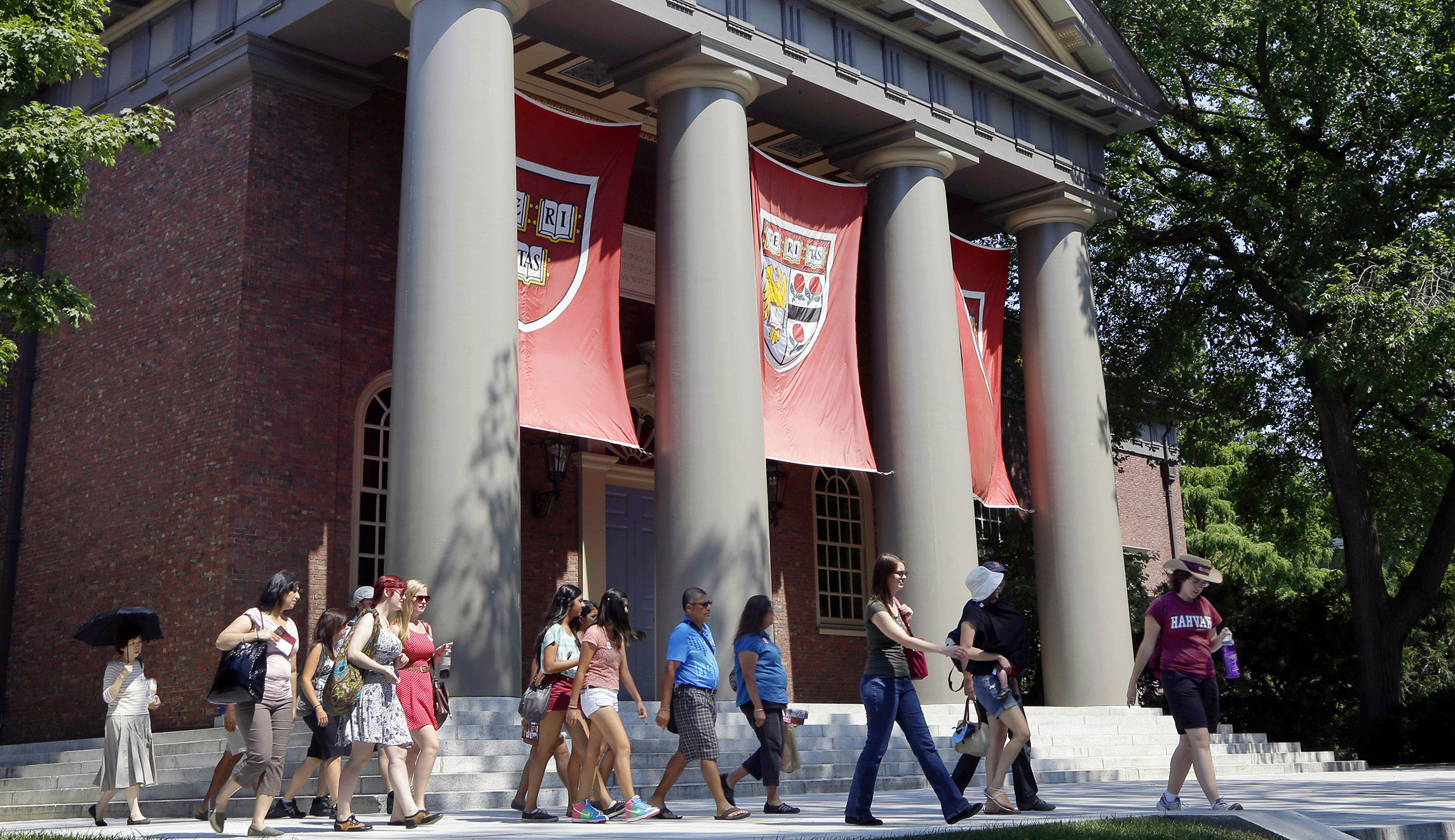

Republicans are set to launch a broadside against colleges and universities if they take control of the federal government next year, eager to impose major changes on a higher education system that has faced intense scrutiny over accusations of excessive liberalism and, more recently, antisemitism.
After years of mounting tensions between universities and Republicans over concerns about free speech and perceptions that college campuses have become political echo chambers, the dam seemingly broke after the start of the Israel-Hamas war.
While the right fringe of the GOP has entertained the thought of a crackdown on colleges and universities for years, the matter has now gone mainstream in the party, with lawmakers plotting behind closed doors for action after the coming elections.
Even Senate Minority Leader Mitch McConnell (R-KY), an establishment stalwart, has spoken publicly about his desire to see Congress tear into the status quo of higher education. In a late-February floor speech, the longtime Republican leader highlighted some of the recent controversies surrounding antisemitism on college campuses and excoriated President Joe Biden’s handling of higher education.
“Perhaps it’s time the government followed the lead of parents and business leaders, and stopped providing taxpayer subsidies to institutions that have clearly lost their grip on reality,” McConnell suggested to his colleagues.
Since the Oct. 7, 2023, attack and subsequent fallout, Republicans have drawn up new legislation targeting the finances of colleges and universities. If Republicans sweep into power during the November elections and seize the White House and both chambers of Congress, the existing higher education system is in for a shock.
“I think if there is a Republican trifecta, there will be action taken to rein in universities, there is no doubt about it,” Jay Greene, senior education research fellow at the conservative Heritage Foundation, told the Washington Examiner.
In the wake of the Oct. 7 attack, videos have proliferated on social media showing students tearing posters of kidnapped Israeli women and children off of campus walls, college professors have faced backlash for controversial statements about Hamas, and the presidents of Ivy League institutions have been forced to backpedal under aggressive questioning by Republicans about campus protests.
But the fallout over the Hamas attack is only the straw that broke the camel’s back. A senior GOP aide in the House told the Washington Examiner that the rash of legislation is the culmination of years of building acrimony with colleges and universities.
“I think there has been a boil for a number of years on the hypocrisy of the higher education system in this country and Oct. 7, the aftermath specifically, certainly peeled the scab off if you will,” the aide said, “in that it exposed that there is something inherently wrong happening.”
The aide said that the bigger story is that people “are over the grift of the formula that’s been going on for too long.”
The formula, according to the staffer, is that colleges and universities get federal funds, then raise money off of the research they do with those funds, and build massive endowments “under the guise” of being a nonprofit institution.
“The whole system, and our reward, is that you’re cranking out antisemites. It’s easy to say that it’s about antisemitism, and that’s a big part of it … but the real issue, I think, is the fiscal insanity associated with the model of higher education,” the aide said, wondering how the current model would ever lead to lower tuition costs for students.
Former Rep. Tom Reed is familiar with the matter at hand. During his tenure in Congress from 2010 to 2022, the New York Republican put forward legislation that would have created an excise tax on university endowments as leverage to reduce tuition for middle-income students — an extremely rare proposal to create a new tax from a Republican. An endowment excise tax was included in the 2017 tax overhaul known as the Trump tax cuts, an early sign of willingness on the right to engage in conflict with major universities.
“This has been building for 10 years now,” Reed said in an interview with the Washington Examiner, adding that the institutions “think they are untouchable and have no incentive to lower university costs.”
Reed characterized the state of higher education as being into a sort of “educational-industrial complex,” which has allowed colleges and universities to rake in huge sums while facing little scrutiny regarding their costs of operations.
While the 2017 Tax Cuts and Jobs Act imposed a 1.4% excise tax on colleges and universities with more than $500,000 in assets per student, Reed had envisioned another plank. He wanted to make it so that universities could suspend the tax as long as they had a plan to drive down tuition costs.
Angela Morabito, press secretary at the Defense of Freedom Institute, said it has been known for a long time that there are “serious problems” in the realm of higher education but that Oct. 7 made it “painfully clear” those problems could no longer be ignored.
Another event that led to greater scrutiny of education more broadly, Morabito said, was when students were forced to learn from home during the pandemic. Parents were able to more closely scrutinize the education system, she said, and became engaged politically in reforming higher education and K-12.
Rep. Virgina Foxx (R-NC), the chairwoman of the Committee on Education and Labor, said that the pandemic laid bare many of the problems with colleges and universities. She noted how institutions charged students full tuition for online classes while not providing them the services they needed.
“I think that added to the negative opinion, not just of conservatives, but people across the country,” she told the Washington Examiner.
Foxx said another moment was the December 2023 hearing in which the presidents of several prominent universities, including Harvard, had problems answering basic questions about antisemitism on campus. She said they “did such a lousy job of talking against antisemitism.”
Foxx said the intense scrutiny facing colleges and universities is likely to persist, noting that it has only grown since the endowment tax was enacted in 2017.
“Now there is talk about doing even more with those institutions with a lot of money,” Foxx said. “What I’m seeing is that peoples’ eyes have been opened up widely about colleges and universities, and it’s much more widespread than it was before the end of last year.”
One notable measure that has been put forward is a bill from Sen. J.D. Vance (R-OH), the College Endowment Accountability Act, that would increase the excise tax on endowment net investment income from 1.4% to 35% for secular, private universities that have at least $10 billion in assets under management.
The $10 billion cutoff would capture only a fraction of the hundreds of colleges and universities in the U.S., although the combined tax burden would be notable.
The schools that would be affected by the Vance plan are Harvard, Yale, Stanford, Princeton, MIT, Penn, Northwestern, Columbia, Washington University in St. Louis, Duke, and Vanderbilt. They hold a combined $270 billion in assets.
Sen. Tom Cotton (R-AR) is another Republican who wants to use higher excise taxes on universities as a way to get them under heel.
Cotton’s legislative proposal, the Woke Endowment Security Tax Act, would institute a 6% excise tax on the endowments of 10 universities. The revenue from the taxes, estimated to be more than $15 billion, would then be used to help fund Israel’s war against Hamas, Ukraine’s fight against Russia, and U.S. efforts to stymy the flow of illegal immigration.
The course Republicans in Washington are likely to take has already been charted at the state level. An effort by Gov. Ron DeSantis (R-FL) resulted in the blocking of all state and federal funds from being used to “advocate for diversity, equity, and inclusion, or promote or engage in political or social activism,” as defined by the Boards of Education and Governors.
In just the past few weeks, the University of Florida fired all staff related to its diversity, equity, and inclusion initiatives. DEI has been a frequent target of Republican officials.
CLICK HERE TO READ MORE FROM THE WASHINGTON EXAMINER
As the 2024 elections approach, Republicans eager to dig into the higher education system are lying in wait. If the GOP ends up winning big, there could be even more big changes coming for colleges and universities.
“Something is going to change here, and exactly how it’s going to change, that’s going to depend on the election results, and it’s going to depend on whether the universities get recurrent problems under control,” Greene, the Heritage fellow, said. “There is going to be a change here.”





